A blog niche is important for your successful online business, and a niche can help you gain loyal customers, adding more revenue but the question is how to choose a profitable blog niche?
Today, almost every major industry we know is saturated, and blogging is gaining more popularity, so how will you make sure that you stand different, when already 600+ million blogs have been published on the Internet and 7+ million blogs are published daily.
Whether you are choosing a niche to run your online business or to start a hobby blog, having a niche will keep you alive in front of your audience.
But out of so many blog niches, which is the right niche for you?
This method of choosing a profitable niche and the secret method I will share below works for:
- A blog website plus an affiliate marketing website
- YouTube
- Instagram, and other social media channels
Let’s start by first finding out the theory and some examples of amazing niche ideas, and then we’ll explore how to choose a profitable blog niche, and the process I will share is 100% authentic and practical.
Choosing a random niche without research will break your blogging journey dreams, you need to follow these steps and a secret formula that I shared below 🙂
In this blog expect:
- Theory In The Beginning
- Pro Tips from time to time
- Actionable Steps (Extremely Effective)
- Practical Brainstorming Sessions
- A Secret Method
- The Ikigai Method
- Learn The Most Authentic Ways On How To Choose A Blog Niche That Makes Money
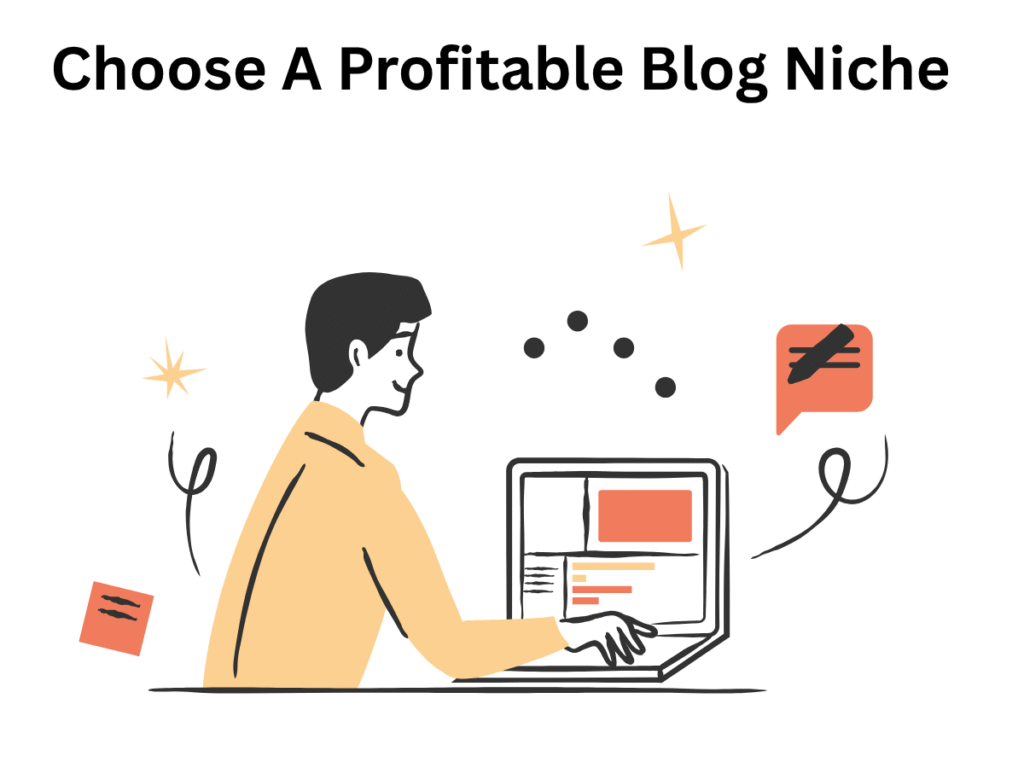
I have 2500+ days of blogging experience, and in this time I have learned the most practical way of how to find a blog niche, and yes, I have failed and succeeded in this multiple times, and figured out why selecting a niche is important.
A niche will solely determine the profitability of your blogging journey, and choosing the right niche is crucial. If you select a random niche, you’re gone for good, and remember that clearly.
A Niche is the lifeline of your blog website, choose it wisely 🙂
Table of Contents
What Is A Blog Niche?
A blog niche is the specialized topic/domain or an industry that you choose to write about and share your unique research with the world.
In a niche blog you are trying to cover a specific topic that covering the entire thing on that industry.
Choosing a niche blog is important as it helps you to:
- Stay focused
- Staying ahead of your competition
- You are targeting a similar audience
- Establishing your authority, and credibility in the industry
- Building loyal audience, trust, and expertise in the long run
So in general a blog niche determines who you are, what are you writing about, what is your expertise, and what you offer to the world to solve real life problems with your solutions.
But why is a niche important? Can we not just start writing and then understand what is working for us? Why does a niche even matter? Why do we need to select one niche?
Why Having A Niche Matters For Monetization & SEO?
A niche helps search engines like Google, Bing, and more to understand what you are writing about and what your expertise is, and why your website brings credibility and authority, and how visitors coming to your website will benefit.
Why having a Niche Matters For SEO?

See, it’s simple: If people come to your website and notice you are writing about sports, and in the next blog you are discussing how to make rice pudding, and again you write about best mobile phone reviews, then this will confuse the readers and even the search engines and it will hurt your SEO rankings. SEO is optimizing your website to rank higher on search engines.
Search engines help us to rank higher so that more people can find us on the Internet, and this way, we can get more views, we can list products, monetize our blog, and even earn money.
So if search engines are confused, remember your niche is not up to the mark, and needs proper refining. Never ever try to confuse people and search engines like Google from the beginning.
This is why first, always write content on the same niche for many months, even years, then if you switch your niche, it will not matter, since everyone will know what you talk about and now that you have an authority, it also means you can have authority on other subjects too. Hope that’s clear.
Why Having A Niche Matters For Monetization?
See, if you don’t do proper SEO, and publish random content, most likely you’ll never get views, unless you are a news website.
If you publish posts in your personal blog that are in the same niche, then there are multiple ways to monetize your content.
If you continue write in a niche consistently then advertise in that niche will be ready to pay you good money, and will not pay you if you start spamming random content on the Internet.
That’s why a silo-structure is necessary; it’s the architecture of your website. If you don’t know how to make one, and how to launch a successful blog practically, then read my 15000+ words detailed practical guide on How to start a blog 🙂 It contains my 2500+ days of honest experience 🙂
Don’t miss it, it can change your life 🙂
Pro Tip: In my 2500+ days of experience as a blogger, initially, when I started my blogging journey, I did focus on my niche, but didn’t narrow it from the beginning. It was my first mistake, never repeat this mistake from your side 🙂 Start from a micro niche or a narrow niche.
Micro Niche vs Narrow Niche vs Broad Niche – Which Is Better?
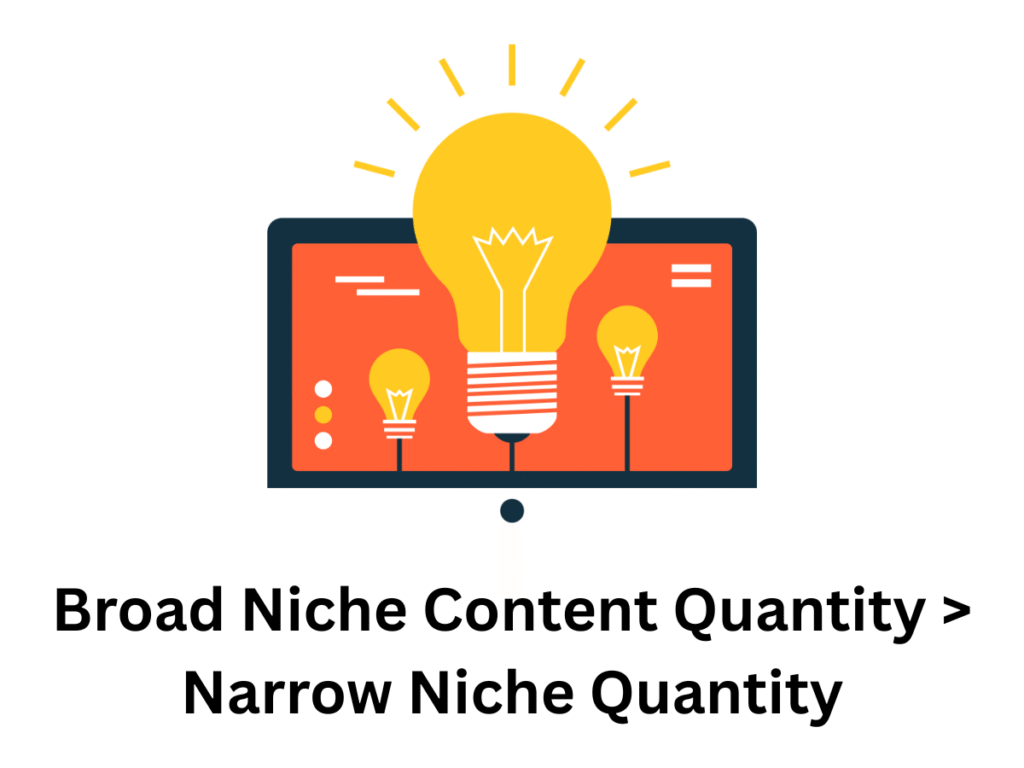
Micro niche and narrow niche both are important in order to make sure your website runs smoothly and is navigation-friendly, but what are these micro niches and narrow niches?
What is a broad niche, and why do we need to understand the differences?
It’s because they serve different purposes together, and for every blogger and website, the demand is different.
What Is A Micro Niche?
Micro niche means a particular segment within a broader industry where you target a specific audience with similar interests, and here you cover every possible question within that small sub-sector of the entire industry.
It helps businesses, website owners, and personal brands to target and craft content for a specific audience, make products that you can sell to them, and eventually turn them into your loyal customers.
They will read similar content, and you’ll build a strong brand with a global audience, building authority and credibility in the long run. A micro niche is more focused than a narrow niche.
For Example, Fitness is an entire industry, and a micro-niche can be fitness for adults above 60. Another example is Technology; it’s a broad niche, and laptops for college students are a micro-niche.
What Is A Narrow Niche?
A narrow niche is like a specialized sub-sector within an industry that can give a sharp edge to businesses and content creators who are starting new in this world of online business.
For example: If sports is a broad niche, then cricket, football, tennis, and chess are sub-niches, and a narrow niche can be advanced equipment for cricket players.
What Is A Broad Niche?
A broad niche means we are covering the overall industry, and signifies that we are covering everything that is inside that specific industry.
For example, Technology is a broader niche, and mobile phones, drones, gadgets, and laptops are sub-niches within the broad niche.
A broad niche means you can cover everything that is present within the main niche. Like the Technology in this example, you can cover all blogs, news, and product reviews; the scope is higher.
What Makes A Blog Niche Profitable?
Now that you have an idea about a niche so how will we determine that a blog niche is profitable, and how can we make money online by writing blogs in that particular niche?
1. High Demand

The first thing is demand, is there enough demand for my niche? There is a thing called demand and supply in economics, and the same concept applies in blogging too; you have to choose to write about something that is in demand.
There are some niches like technology, blogging, sports, luxury travel, video editing software, finance, etc., that consistently are in demand and many people search for them daily on Google and all over the Internet.
Such types of niches are evergreen and are in demand.
Pro Tip: If you miss searching for whether your niche is in demand or not, then you will suffer in blogging 🙂
There are multiple tools that can help you determine whether a topic is in demand or searchable by real people or not. For example: Google Trends
Down below in the keywords tool section, we will learn how to identify such niches/topics.
2. Monetization Opportunities
The next thing you must keep in your mind is the monetization opportunity as if you are writing a blog or building a website so that later you can monetize it and earn passive income then this is a point you cannot miss.
For every niche, monetization options are a bit different, and choosing the right niche will help you to discover and earn a lot of money from ads, affiliates, and much more.
3. Level Of Competition
Some niches are highly competitive, and the level of competition is different for every industry.
For example, The Technology industry has a lot of competition compared to the new industry like Climate Technology; similarly fashion niche is competitive, soundproof rooms niche is less competitive.
Pro Tip: You need to find a niche that suits you, and must match your interest too, its not only about the level of competition and number of monetization options.
4. Keyword Difficulty
In a niche, if you are writing a blog post, then remember that keyword difficulty is something you cannot ignore, especially when starting out.
Pro Tip: The lower the difficulty, the more chances you’ll have to rank higher, so always make sure you never start with a Keyword Difficulty of 30 or above. To learn all of this, please go to the link I shared above on how to start a blog, read it, and understand how you can do this 🙂
The link is there in the section above, why having a niche matters for monetization? 🙂
5. Evergreen Topics vs Trends
Pro Tip: A niche should never be selected based on current trends, as there are some niches that go away with time. Always make sure you choose an evergreen niche, where content will always be published 🙂
You need to identify such niches, and now that you understand what a niche is and what makes a blog niche profitable, now let’s understand the method on how to choose a blog niche that makes money online, and now it starts down below 🙂
This Is How To Choose A Profitable Blog Niche
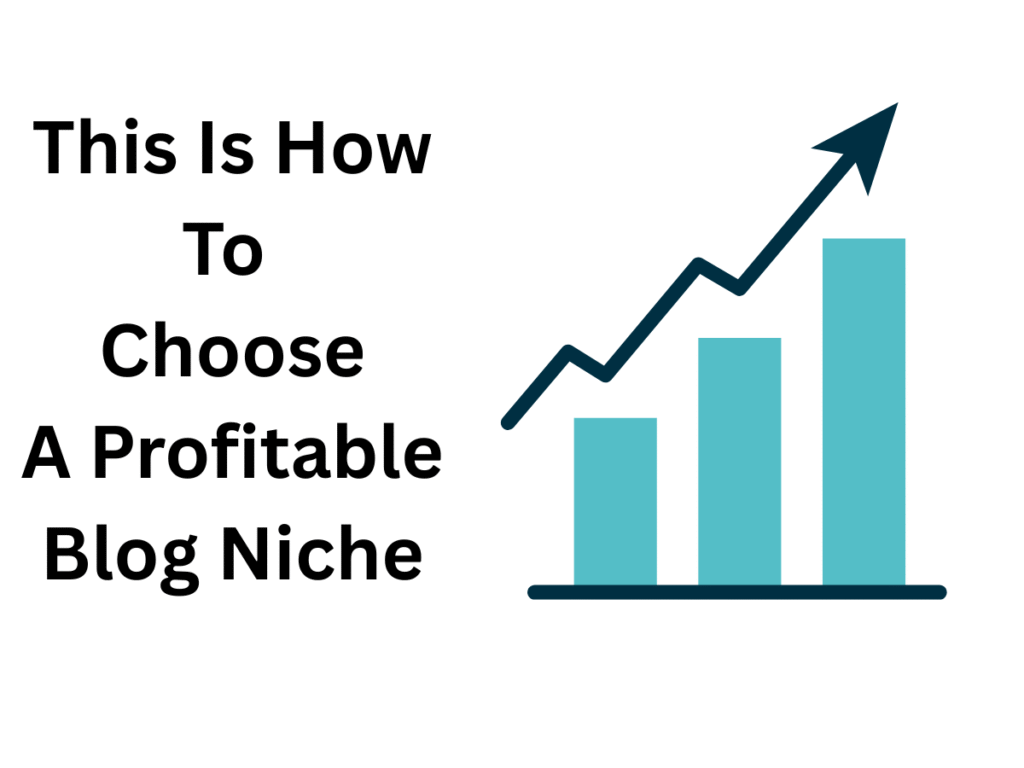
In order to choose a profitable blog niche, there are 6 multiple steps we need to consider before launching a blog website, as many beginners often fall into this trap and never follow this 100% authentic method that works exceptionally well.
We will also learn a Secret Formula To Find your niche sooner in the end 🙂
We need to look for:
- Buyer Intent/Search Intent
- Earning Potential
- Search Volume
Once you understand these 3, you will be able to pick your golden niche.
1. Brainstorm Your Ideas & Expertise Logically
brainstorming your ideas is the first crucial step to identify your niche. Ask yourself:
- What Is your expertise?
- Which topic or industry can you cover easily?
- Is there enough content or questions people ask on the Internet?
- Are there enough Books discussing about that specific niche already?
- Is your niche profitable?
These are some basic questions which you need to answer first, in order to identify your niche.
Blog niches are amazingly important and help you focus on a particular audience, and serve their purpose but first, manual brainstorming is the most practical way.
Once you answer these questions, think:
- What is my audiences pain point?
- Are they looking for information or products or both?
- Is my content solving their problems?
A. Look At Your Interests
Your deep interest matters; if you do not enjoy what you write, then how will you continue producing informative content?
Pro Tip: If you don’t choose what you love, but rather choose an industry based on money and profits, you will see serious burnout, loss of time, energy, and eventually money, too.
Interests drive results, interests deliver motivation to deliver value, interest brings happiness, and the urgency in your mind to help and make money.
So Your Actionable Step: At this stage, choose 3-5 Niches/Topics you love to talk about. It can be technology, Yoga, Swimming, Football, Education, cooking, gaming, Gardening, Chemistry, etc., anything. Write it down somewhere. Make sure you choose them wisely, try to narrow them down too 🙂
Remember: Never try to only use AI to choose a Niche and skip manual brainstorming, you’ll regret it later for sure 🙂
B. Identify Core Desire
Identify the real reason why people should follow you, what is that they are looking for, is it infomation, a product review that’s genuine? An ifographic, template, a book?
Whatever it is, pick whatever is required, search on the Internet by typing your niche name, and see what other people are writing, publishing, and promoting; this way, you’ll get ideas quickly.
C. Broad Or Narrow
Now that you have a list of 3-5, or even 7, niches you chose in the previous stages, this is the time to narrow it down a bit, since it’s not possible for a beginner to cover an entire niche initially.
For Example: If you choose Gardening, Niche it down to Gardening Tips For Beginners, or Terrace Gardening In Urban Areas, you get the point right? But still, your core niche should be gardening.
Pro Tip: Always look and choose a Broad Niche, but when starting a blog or website, start with a narrow niche, to build credibility, authority, quick expertise, and trust 🙂
D. Future Growth Potential

This is seriously important, whether or not your industry is evergreen or outdated, it will affect your journey, and choosing an evergreen niche will eventually help you craft content but how do you make sure that your niche will not get outdated?
It Simple: Read News, Search on Google like if your niche is Gardening then search: Future growth potential of gardening blogging industry, this way you’ll get ideas.
Also, think logically, Is Gardening ever going to end? No, people love gardening, whether it’s your whole farm, terrace, kitchen, etc., it doesn’t matter, right? Be practical too 🙂
E. How Is Your Expertise Valuable?
Even if you think you are not a master at teaching or you don’t have a degree to write about the industry you are talking about, it doesn’t matter.
If you have some initial knowledge, its fine, you can build your knowledge and trust over time, but think is your expertise truly going to help the audience? If Yes, how?
Now, you should have 3-5 niches ready. We just need to follow some more steps to finalize your niche.
2. Use Proper Keyword Research Tools
To determine your final niche, use proper keyword research to analyze market demand, and future potential of the niche.
There are multiple tools you can use to analyze your niche and the related keywords in your niche and they are:
- Google Trends
- Google Keyword Planner
- Ahrefs
- Semrush
- Ubersuggest
- Keywords.io
- Wordstream, and more
A Practical Example: (Google Trends)
Let’s say I want to check the niche finance, so I’ll go to Google Trends and search Finance, and I’ll check whether the trend is the same, increasing, or decreasing, and what is the overall market demand.
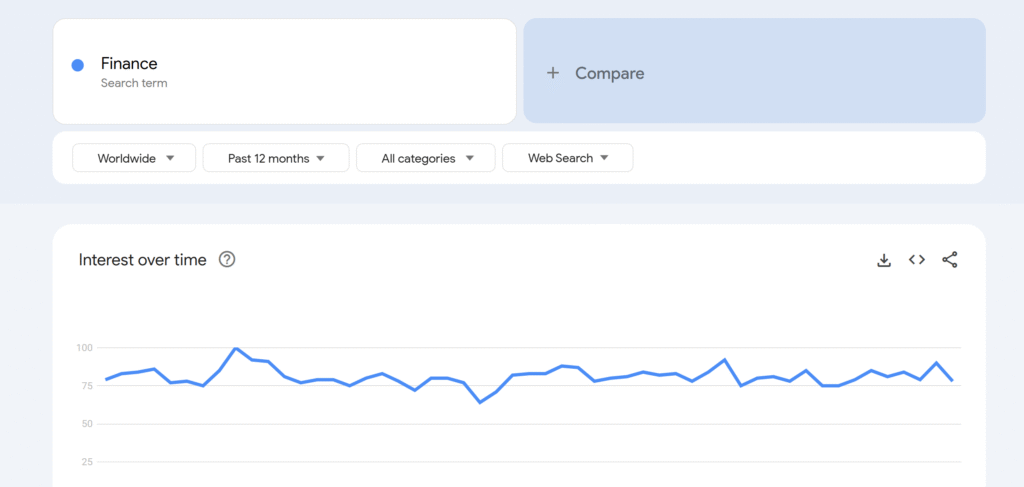
Now, choose the filter for the past 5 years, see whether the graph is the same, decreasing, or increasing, you can predict the future and see how it’s going to perform.
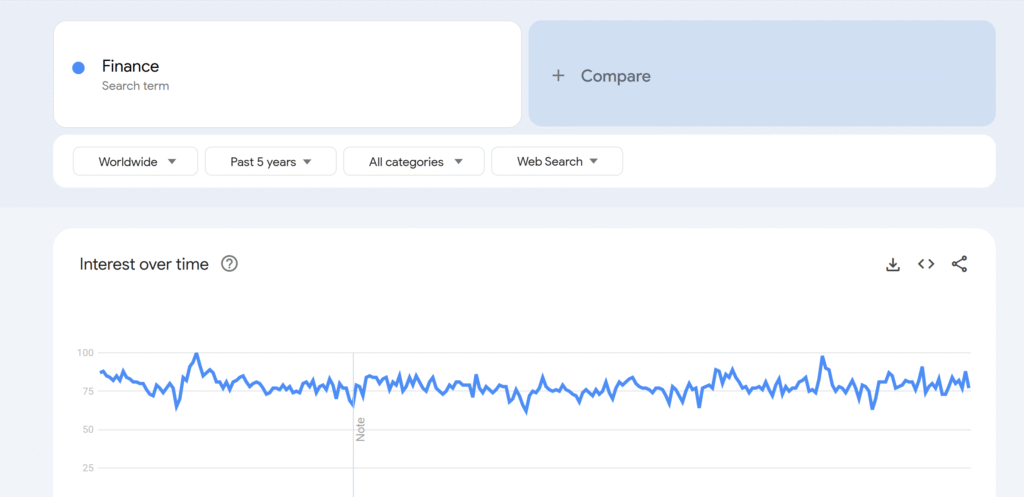
Now, go to Google, and type this, replace the word Finance with your niche, and see the future market potential.

3. Analyze Your Competition
Try to analyze your competition.
- Go to Google, type your niche, then open websites/blogs inthat niche, read, and navigate other’s website and check what type of content they are publishing, which are getting more views.
- Use Keyword Tools like SEMrush, Google Keyword Planner, and type the keyword (search term), and check the competition by filtering out data.
- Install DA, PA extension, and check the websites with low DA, PA, and try to replicate their content and strategy with your uniqueness. (I taught all these on my previous blog post: how to start a blog and make money online, don’t miss it.)
4. Create A Silo-Structure Followed By A Pillar Page To Test Your Niche (Optional)
A silo-structure helps your entire website to be structured so that search engines and users ca navigate and understand your website easily.
When you are selecting a niche, or if you have already select your final niche, remember you should create a silo-strucuture, like First Write the broad niche name, then the sub-niches, narrow niches.
Pro Tip: Most beginners and even intermediate bloggers miss this, and regret their blogging journey 🙂 Always create a silo-structure before creating a website, I taught this too o the blog post how to start a blog :), link is above.
Here is an example of the silo-structure for the niche, Gardening.
Remember: You need to follow a similar strategy for your content:
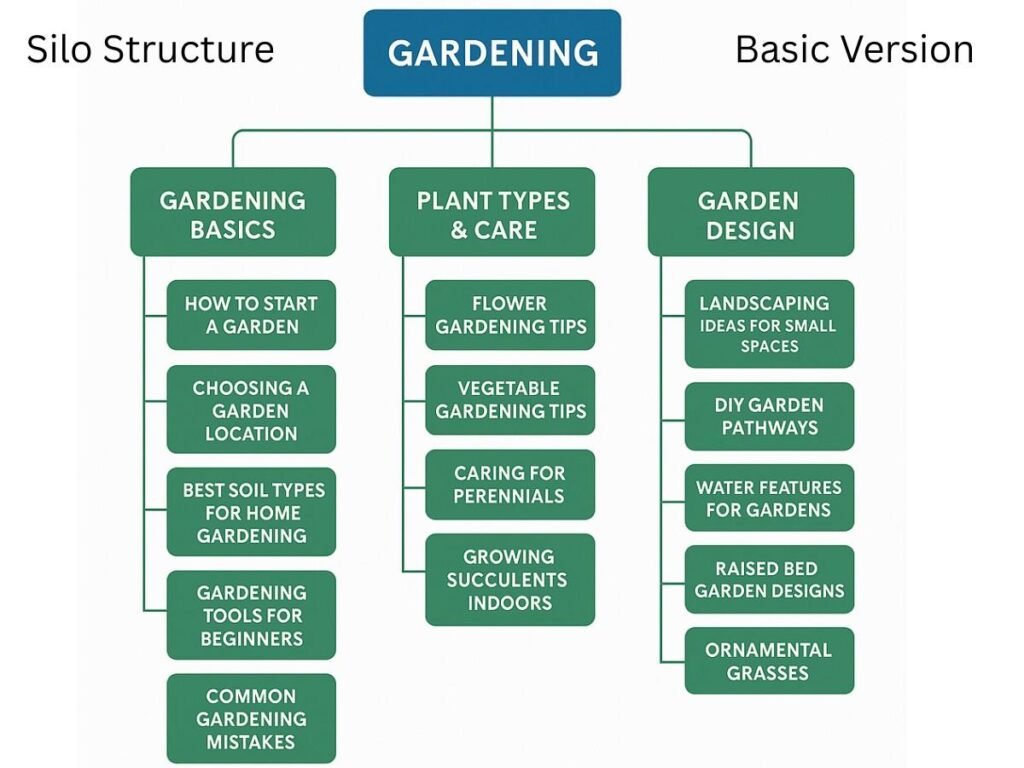
5. Check Monetization Options
Go to your competitors website, analyze how they have monetized their content and by this check:
- Are there any ads on their website?
- Is there any product they are referring in their articles?
- Is there any Shop Page?
- Are they selling any courses?
If there are some things available, then the niche is good enough for you to focus on and build your online community by building your online business.
6. The Secret Formula
The secret formula is ECASHNICHE, and it’s powerful. Let me break it down further:
- E denotes Evergreen (Make sure your niche is evergreen, if not the at least should be relevant for the next 5-7 years)
- C means Clarity (The topics in the niche must be clear to the audience, and must serve a purpose to fulfill)
- A reflects The Audience (The Type of Audience interacting within the Niche is crucial, are they kids, working, professionals, or adults? This will help you craft content based on their reading skills, look at other social media platforms too)
- S is searchability (Check whether topics in your niche are searchable or not, is there any content on that topic, are people searching for it?)
- H is High-value (Is your niche fulfilling high-values? Topics like Finance, Food for example must deliver value to your audience, any general stuff won’t work anymore, think, and take your time)
- N means Narrowed-Down (Is your niche too narrow or broad?) It should be a bit broad, but start writing from the narrower space, use keyword research tools to find out, and create a silo-structure as shown above)
- I reflect Interest (Does this niche interest you to write more content, if you get bored or get tired easily, its not for you, leave it then, and is the audience interested in it? use Google Trends to Identify)
- C reflects Competition(Always make sure that there is a decent competition; no competition means no one is either genuinely interested, or the monetization options will be very low)
- H means High Demand (The topics, keywords in your niche must be high in demand, and the keywords should have good volumes, at least 500, or above, check Keywords in Keyword Research tools like SEMrush, and analyze whether its useful or not)
- E means Earning Potential (The more monetization options are there, the more opportunity is waiting for you outside to make more money)
If your niche even checks 5-7 points out of 10, then it’s a good niche.
Pro Tip: Always Check This Checklist Before Finalizing Your Niche.
Actionable Step: Use Keyword Research Tools, People also ask sections, and Google autosuggests in Google, track competition, and determine your niche.
7. Manual Method
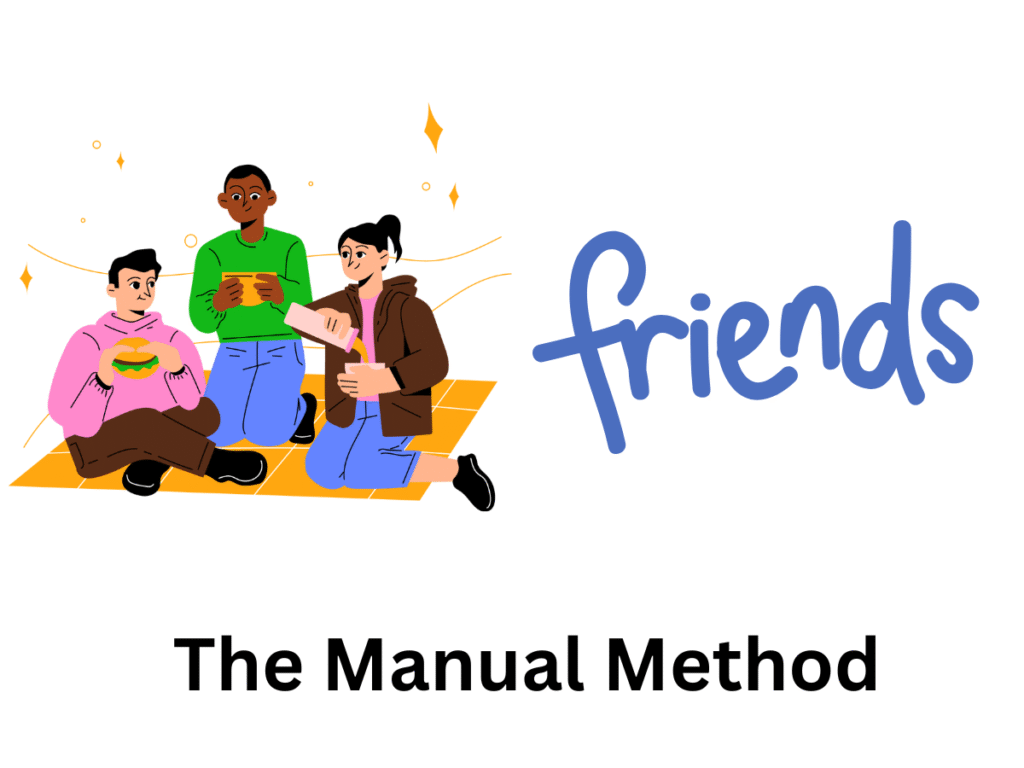
Ask your family, friends, or make notes of activities or studuies subjects you are good at, check the books, contents, videos, audios all over the Intenret, on Amazon too, and try to find whats working for everyone, choose a niche by namual method + thesteps I suggested above.
By now, you should have finalized your niche 🙂 If not, then follow the effective Ikigai Method to find your niche 🙂
Some Niches You Must Avoid
There are some niches to avoid based on the demand and monetization options, and they have a chance to get outdated with time.
This is why it’s a reminder, use the above formula, and check whether or not your niche is outdated or not, if in Google trends, the chart is falling in the “time-zone of past 5 years”, it means the niche is getting saturated or people have stop talking about it like they use to do before.
Common Mistakes New Bloggers Make In Finding a Niche
Here are some mistakes that almost every beginner makes, and I did the same:
- Never focus on following the 7 steps above
- Specially ignoring the ECASHNICHE Formula before finalizing a niche
- Not checking the market demand
- Avoiding Competitor Analysis
- Focusing On A Broader Niche Right From the Beginning
- Avoiding brainstorming and asking AI tools like ChatGPT to find a Niche.
The Ikigai Concept For Bloggers
This is a concept you cannot miss. In order to choose a niche, follow everything we just learned, and try to put them inside the circles, pick 2-3 best selected niches, by now.
If you had 3-5, or 7 niches chosen previously, now you must have finalized your niche, if not, come down to 2 options, and try to fill in the diagram, and see which is more suitable for you.
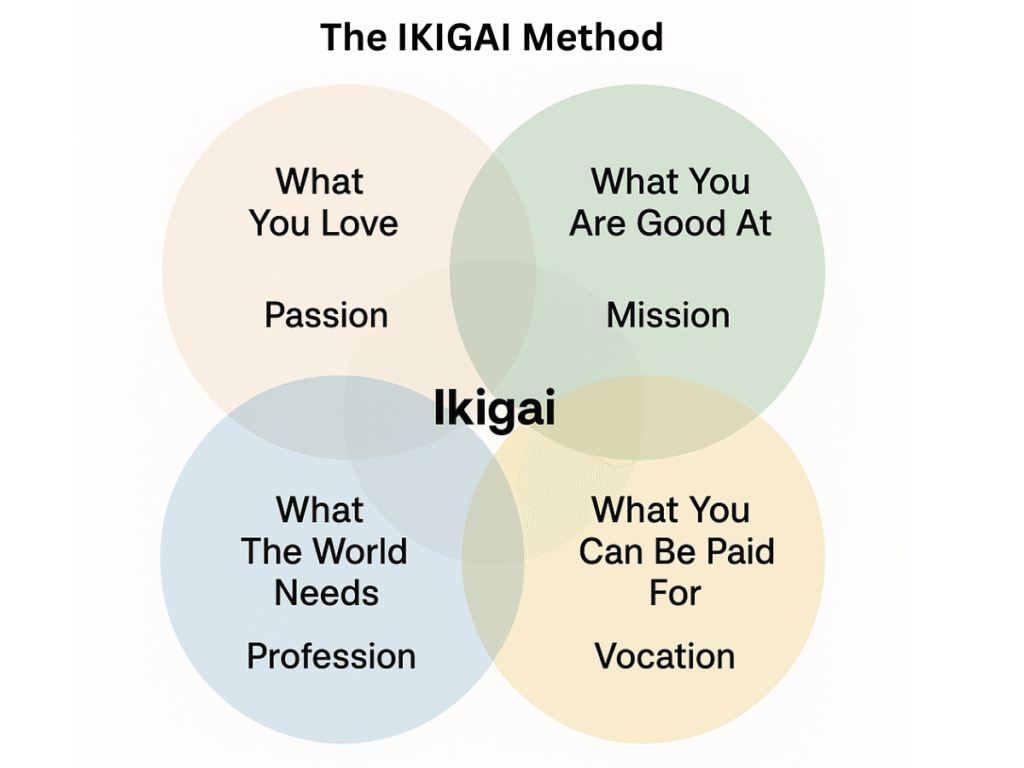
After following every step till now, you must have a final niche selected. Congratulations 🙂
Now let’s focus on Case Studies & common questions people ask while choosing a profitable niche to make money online and grow their online business.
Bloggers Website Niches Case Studies That Worked
So many websites have focused on specific niches that have them brilliant results and even made money in millions of dollars.
They didn’t focus on multiple blog niches, or were confused about how to choose a blog niche that makes money, they had followed the step-by-step processes and focused their work.
Websites like NerdWallet focus on finance and have an annual turnover in multiple millions of dollars every year; they are super focused.
NeilPatel is super famous and educated people about marketing, digital marketing, SEO, and more, and generates millions of dollars too.
But they are established, they have build quality blogs, and credibility, authority, by showcasing experience, and generating trust, today they are the king of their niches.
Pro Tip: You have to follow the same, be different, provide something unique that no one can duplicate 🙂 Try to add your experience to your blogs, and stand out from generic advice.
FAQ Section On How To Choose A Profitable Blog Niche
What Niche Is Most Profitable?
Niches that consistently perform well, are always in demand, and the most profitable are Finance, Technology, Digital Marketing, Health & Fitness, and Make Money Online. They are all evergreen niches as of today.
How Do I Start A Niche Blog?
In order to start a niche blog, first find your niche by following the ECASHNICHE and Ikigai method or manual brainstorming. After that, choose a blogging platform like WordPress and hosting like Hostinger, then create your website, and publish pages. Now you can design your blog and start writing blog posts, after a few months, apply for monetization, and earn money.
How Do I Pick A Niche?
You can easily pick a niche by brainstorming ideas, asking your friends/family what you are good at, following the ECASHNICHE and Ikigai method that speeds up the process to choose a profitable niche, and checking the market demand and future growth potential of your niche using Google Trends and other keyword research tools. Never depend on AI solely to choose a niche, please.
Conclusion: How To Choose A Profitable Blog Niche
This entire post is dedicated to everyone who has an intention to serve the people, and the Internet with their valuable knowledge, but only after following these unique steps, you’ll be able to understand the entire process of how to choose a profitable blog niche.
Start by choosing a broad niche, and narrow it down, cover the narrow niche, once it’s covered, broaden your wings, and always make sure you keep the audience, market demand, and monetization potential in your mind.
Choose a niche, All the best 🙂

With 7 years of blogging experience and I have worked on multiple niche and now I want to make sure I share what I learned over the years and master Digital Marketing and Blogging for the Future in this AI World.
I hold a masters degree in Climate sciences and policy and bachelors in Environmental Sciences and I’ll make sure you will get authentic, original, fresh, data-backed content.
I’ve dedicated myself to blogging with authenticity, honesty, transparency, depth, and purpose — not chasing trends, biasness or opinions, but sharing truth-based insights, timeless knowledge, and fact-rooted research that can empower lives across generations.
TimelessAim.com is not just a blog or a business.
It is the soul’s mission — to serve the world through truth, wisdom, honesty, right knowledge and educate people about the online world through latest digital marketing information.
Every single blog, article, tool, and project is built to share authentic, unfiltered real knowledge. Restore trust in information for all.
Building a legacy, an empire that starts with selfless truth and ends in global upliftment, helpful for everyone.
When information becomes sacred, the world totally transforms – Its True.
That’s the aim — and that’s the promise of TimelessAim 🙂

